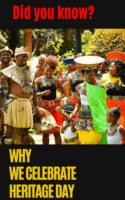Heritage Day is a South African public holiday which honours the culture and diversity of the traditions and beliefs of all South Africans.
South Africans celebrate Heritage Day on 24 September and recognise the cultural wealth of our nation. Every year on this day people get to eat, drink and celebrate what makes us distinctive South Africans. South Africa is famously known as the rainbow nation because of its diverse cultures and regions. South Africans stage different events throughout the country to celebrate this day.
South Africa is a diverse nation which has eleven official languages and is made up of many different cultural groups. South Africa has a strong sense of unity around longstanding traditions, despite the many differences amongst its citizens.
The history of Heritage Day
In Kwa-Zulu Natal, the 24th of September was known as Shaka’s Day, a day which celebrated the legendary Zulu king Shaka Zulu. Shaka played an essential role in uniting different Zulu clans in one unified strong Zulu nation in Kwa-Zulu Natal.
Shaka Day was celebrated in honour of Shaka Zulu who was the Zulu king from 1816 to 1828. Shaka Zulu was one of the most influential monarchs in the Zulu kingdom.
In 1995, this day was omitted from the proposed Public Holidays Bill but the Inkatha Freedom Party objected. Along with reconciliation, a day on which everyone in the country could celebrate cultural heritage was created.
In an address marking Heritage Day in 1996, former President Nelson Mandela stated:
“When our first democratically-elected government decided to make Heritage Day one of our national days, we did so because we knew that our rich and varied cultural heritage has a profound power to help build our new nation.”
How South Africans celebrate Heritage Day
South Africans celebrate this day by remembering the cultural heritage of the diverse cultures that make up the population of South Africa. Different events are held throughout the country to commemorate Heritage Day. In these events South Africans dress in traditional attire associated with their cultures and customs.
Heritage Day is all about bringing South Africans together. The simplest way of celebrating diverse cultures is arguably through food. South Africans spend this day braai-ing with family and friends. The meat is cooked on fire and is normally accompanied by beverages.
National Braai Day
In 2005, a media campaign attempted to rebrand the Heritage Day as National Braai Day. On 5 September 2007 Archbishop Emeritus Desmond Tutu was made the National Spokesperson for Braai Day.
Addressing National Braai Day Archbishop Tutu said: “There are so many things that are pulling us apart,” and “this has wonderful potential to bring us all together…. We have 11 different official languages but only one word for the wonderful institution of braai: in Xhosa, English, Afrikaans, whatever.”
At the end of 2007 National Braai Day changed its name to Braai4Heritage and the initiative received the endorsement from South Africa’s National Heritage Council.
Why Heritage Day is important for the youth of South Africa
Heritage Day is important for the youth of South Africa because it makes them aware of their differences, enables them to understand and respect other cultures. Observing heritage is the foundation of all communities and is an important source of identity.
To South Africans, commemorating heritage is the foundation of all communities and an important source of identity. Celebrating heritage plays an essential role in promoting cultural diversity, economic diversity, peace and social solidarity.
It is therefore important for South Africans to commemorate Heritage Day as it creates an opportunity for South Africans to put differences of opinions and politics aside and come together to celebrate the country’s history.
If you liked this, you can read about what causes beer bellies here
***
Tell us: What does your country’s heritage mean to you?

